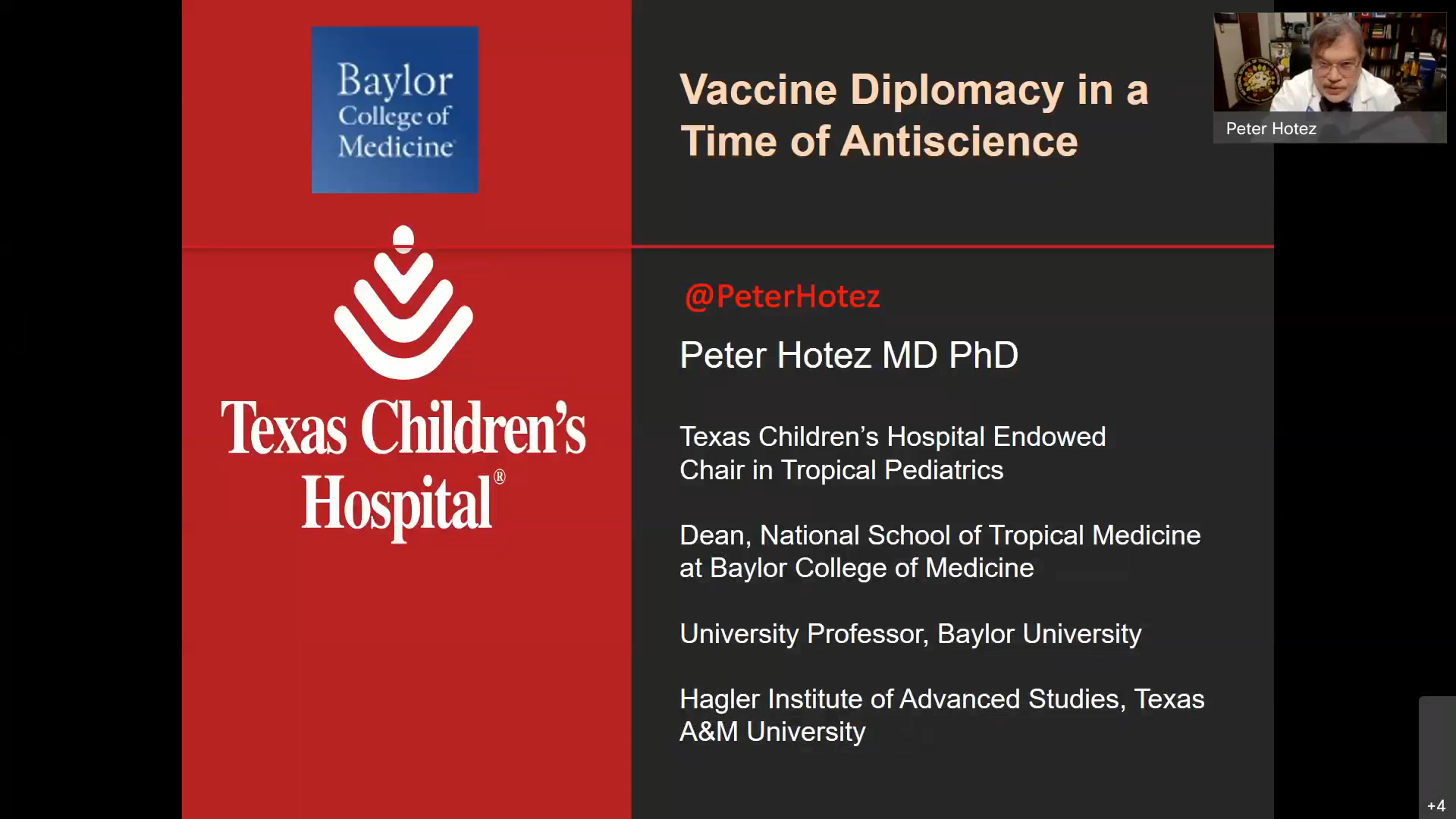Hotez presents as part of Global Health Lecture Series
The Center for Global Health featured Peter Hotez, MD, PhD, expert in the fields of global health, vaccinology, and neglected tropical disease control, as the presenter for its Second Annual Global Health Lecture Series, held via WebEx Nov. 15.
Dean of the National School of Tropical Medicine at Baylor College of Medicine and professor in the Departments of Pediatrics and Molecular Virology and Microbiology, Hotez also holds an endowed chair in Tropical Pediatrics at Texas Children’s Hospital and is co-director for the Texas Children’s Hospital Center for Vaccine Development.
Recently, Hotez has been leading national efforts to defend vaccines, serving as an ardent champion of vaccines against a growing “antivax” threat. Hotez has been fighting the spread of misinformation on multiple fronts while at the same time promoting his scientific work.
About a decade ago, Hotez and his colleagues adopted a coronavirus vaccine program, collaborating with the New York Blood Center to begin making various SARS and MERS vaccines.
“We’ve had a lot of experience making SARS and MERS vaccines,” Hotez said. “When the COVID-19 sequence came out in January 2020, we were able to pivot and make a COVID-19 vaccine that we hope can be released for emergency use in India.”
Hotez said that has passion has always been to develop what he calls “antipoverty” vaccines. Antipoverty vaccines, he explained, are for diseases that pharmaceutical companies generally are not interested in making, because they’re vaccines for diseases that affect the world’s poorest people living in extreme poverty.
In order to fight the ongoing COVID-19 pandemic, medical professionals and scientists helped develop vaccines in record time using messenger RNA (mRNA) technology, which teaches an individual’s cells how to make a protein that will trigger an immune response inside the body. While the advanced technology, and the speed at which they were produced, is incredible, the new technology is not so easily replicated to accommodate the world’s population, he explained.
“Everybody was so focused on speed to vaccinate through new technologies, that no one ever gave any thought to simultaneously ensuring that we have a durable, low-cost vaccine that we can scale now for the world,” Hotez said. “So even though mRNA vaccines can move quickly in terms of speed and starting to vaccinate populations, there’s a problem with scale. With any new technology, there’s a learning curve before you can go from zero to 9 billion.”
To combat the growing needs for vaccines worldwide, Hotez and the Texas Children’s Center for Vaccine Development created a recombinant protein subunit vaccine, similar to those created to vaccinate against viruses such as human papillomavirus (HPV) and the hepatitis B. Recombinant protein vaccines are inexpensive to make and are easy to replicate, Hotez said.
“We’ve now licensed this to Biofarma in Indonesia, Biological E in India, and Incepta in Bangladesh,” Hotez said. “Right now, India is the furthest along, where they’ve named the vaccine Corbevax. It’s very much a co-development program. We do this without patents. It was licensed non-exclusively to BioE, and they’ve scaled it up to 100 million doses per month, and the Indian government has done an advanced purchase of 300 million doses.”
While Hotez is a leading expert on vaccines, he has also had to become an expert on the rising problem of anti-science that is spreading throughout the country.
“Unfortunately, I’ve become an expert in not only vaccine science, but also vaccine anti-science, because I do have my youngest daughter, Rachel, who has autism and intellectual disabilities, and a few years ago I wrote a book called ‘Vaccines Did Not Cause Rachel’s Autism,’ which made me public enemy number one or two with the anti-vaccine groups, so I became an expert in that aspect as well,” Hotez said.
Hotez said that vaccine hesitancy started more than two decades ago, when a fake paper was published in The Lancet in 1998 claiming that the measles, mumps, and rubella (MMR) vaccine led to the development of autism in children. Though the paper was eventually retracted, it was not until years later, and the anti-vaccine movement had already begun.
“It was shown to be false and retracted, but that kind of gave birth to what started as a small movement and has now become a monster,” Hotez said. “Since then, the anti-vaccine movement has morphed or changed and has become more of a political movement.”
Hotez, whose newest book “Preventing the Next Pandemic: Vaccine Diplomacy in a Time of Anti-science,” continues the fight against anti-science, said that the opportunity opens the doors for more collaboration in science.
“It’s sort of a wakeup call that we need to be able to interact with our social science, humanities, and earth sciences colleagues more,” Hotez said. “Disease has become so complicated, and it goes so far beyond the biomedical sciences, and of course the big driver now is the rise in anti-science.”
The Center for Global Health at McGovern Medical School aims to advance clinical service, education, and research activities aimed at addressing health disparities locally and globally. The center promotes social justice and health equity, to enhance awareness in the medical school community of the unique challenges associated with healthcare deliver to marginalized populations, and to pioneer efforts to mitigate such challenges to improve health outcomes for all.
Recording link: https://uthealth.webex.com/uthealth/lsr.php?RCID=efc9cc497236bac2847edb763f83e91c